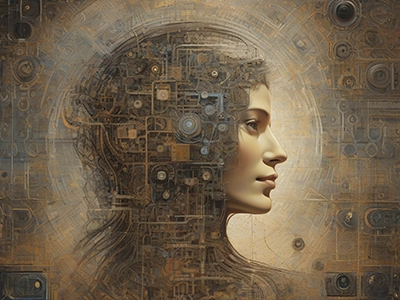Understanding its complexities and implications is crucial in the swiftly evolving realm of artificial intelligence (AI). Bryan Alexander’s meticulously curated reading list for graduate students and scholars is more than just a collection of texts; it’s a comprehensive guide through the intricate world of AI. This list, enriched by community contributions and expert insights, is an invaluable resource for those seeking to navigate the multifaceted impacts of AI on society, ethics, and technology.
The Essence of the List
Alexander’s compilation is a rich tapestry of diverse formats and perspectives. Alexander’s articles, blog posts, short stories, and seminal books reflect the depth and breadth of AI, covering everything from ethical dilemmas and societal impacts to technological advancements and historical perspectives.
Featured Readings
- Jiafu An, Wenzhi Ding, and Chen Lin, “ChatGPT: tackle the growing carbon footprint of generative AI,” Nature, March 21, 2023.
- Brent Anders, The AI Literacy Imperative. Sovorel Publishing: 2023.
- The Artificial Intelligence Incident Database.
- Emily M. Bender, Timnit Gebru, Angelina McMillan-Major, and “Shmargaret Shmitchell,” “On the Dangers of Stochastic Parrots: Can Language Models Be Too Big? 🦜”
- “Blueprint for an A.I. Bill of Rights.” White House, 2022.
- Ian Bogost, “ChatGPT Is About to Dump More Work on Everyone” and “ChatGPT Is Dumber Than You Think.” The Atlantic, 2022 and 2023.
- Nick Bostrom, Superintelligence: Paths, Dangers, Strategies. Oxford University Press: 2014.
- Nick Bostrom and Eliezer Yudkowsky. “The Ethics of Artificial Intelligence.” The Cambridge Handbook of Artificial Intelligence, Cambridge University Press, 2014. Free access: http://faculty.smcm.edu/acjamieson/s13/artificialintelligence.pdf
- James Bridle, “The Stupidity of AI,” The Guardian, March 2023.
- Vannevar Bush, “As We May Think,” The Atlantic, originally published in 1945.
- Ted Chiang, “ChatGPT is a Blurry JPEG of the Web” and “Will AI Become the New McKinsey?” The New Yorker, 2023.
- Seán Clarke, Dan Milmo and Garry Blight, “How AI chatbots like ChatGPT or Bard work – visual explainer.” The Guardian, November 1, 2023.
- Kathryn Conrad, “Sneak Preview: Blueprint for an AI Bill of Rights for Education,” Critical AI 2.1., July 2023.
- Eamon Costello, “ChatGPT and the Educational AI Chatter: Full of Bullshit or Trying to Tell Us Something?” Postdigital Science and Education, 1-6. (2023)
- Tyler Cowen and Alex Tabarrok, “How to Learn and Teach Economics with Large Language Models, including GPT “SSRN, last revised May 2023.
- Kate Crawford, Atlas of AI: Power, Politics, and the Planetary Costs of Artificial Intelligence. Yale University Press: 2021.
- Yun Dai, Ang Liu, and Cher Ping Lim, “Reconceptualizing ChatGPT and generative AI as a student-driven innovation in higher education,” Procedia CIRP Volume 119, 2023, Pages 84-90. https://doi.org/10.1016/j.procir.2023.05.002.
- Douglas Engelbart, “Augmenting Human Intellect: A Conceptual Framework | Doug Engelbart Institute.” Doug Engelbart Institute. Originally published October 1962,
- Jason Fagone, “The Jessica Simulation.” San Francisco Chronicle, July 2021.
- Tirse Filibeli, “Big Data, Artificial Intelligence, and Machine Learning Algorithms: A Descriptive Analysis of the Digital Threats in the Post-truth Era,” Galatasaray University Journal of Communication, issue: 31, 91 – 110, December 28, 2019.
- Harry G. Frankfurt, On Bullshit. Princeton University Press, 2005.
- Jason Furman, “Is this time different? The opportunities and challenges of artificial intelligence.” Remarks at AI Now: The Social and Economic Implications of Artificial Intelligence Technologies in the Near Term, New York University, 2016.
- Leon Furze, Teaching AI Ethics, blog post series, 2023.
- Gartner Research, “What’s New in the 2023 Gartner Hype Cycle for Emerging Technologies.”
- “GenAI Practical Use Cases,” CPA.com, 2023.
- Chris Gilliard, “Friction-Free Racism.” Real Life, October 15, 2018.
- Lauren Goodlad and Samuel Baker, “Now the Humanities Can Disrupt ‘AI,'” Public Books, 2023.
- Sam Harris, “Can We Contain Artificial Intelligence?: A Conversation with Mustafa Suleyman,” Making Sense podcast, episode #332, 2023.
- “Debating the Future of AI: A Conversation with Marc Andreessen” Making Sense podcast, episode #324, 2023.
- Alex Heath, “Poe’s New Desktop App Lets You Use All the AI Chatbots in One Place.” The Verge, August 28, 2023.
- Sheila Heti, “According to Alice,” The New Yorker, 2023.
- Wayne Holmes and Ilkka Tuomi, “State of the art and practice in AI in education.” European Journal of Education, volume 57, issue 4, December 2022, pp 542-570. https://doi.org/10.1111/ejed.12533
- Ayanna Howard & Jason Borenstein, “The Ugly Truth About Ourselves and Our Robot
- Creations: The Problem of Bias and Social Inequity.” Science and Engineering Ethics 24, 1521–1536 (2018). https://doi.org/10.1007/s11948-017-9975-2
- Alex Langstaff, “The Bulgarian Computer’s Global Reach: On Victor Petrov’s ‘Balkan Cyberia,'” Los Angeles Review of Books, November 10, 2023.
The Significance” of the Selections
Each piece in this collection offers a unique lens through which to view AI.
Conclusion
This curated list is not just a set of readings; it’s a journey through the world of AI. It invites scholars to engage, question, and contribute to the discourse surrounding one of our time’s most transformative technologies.







